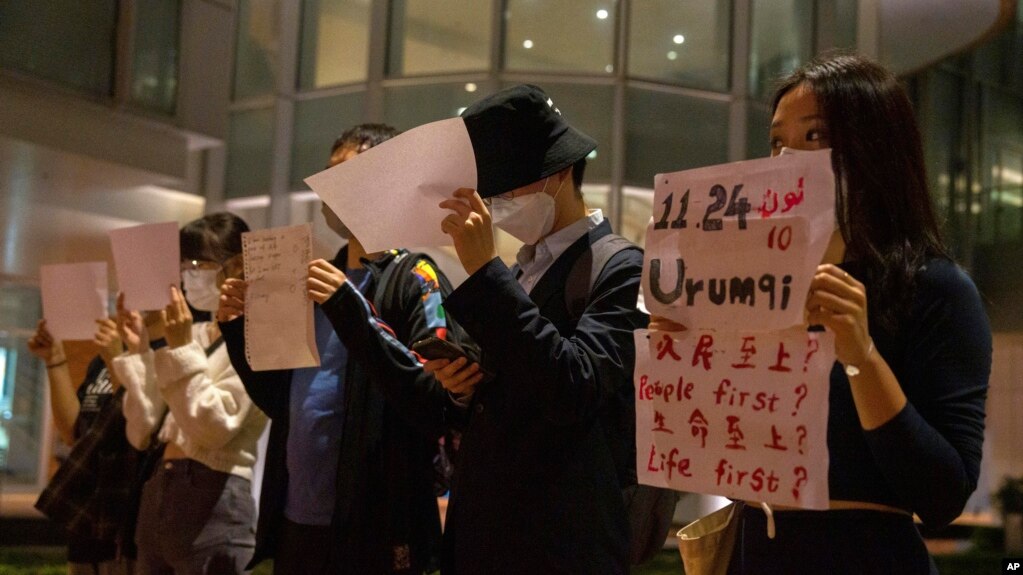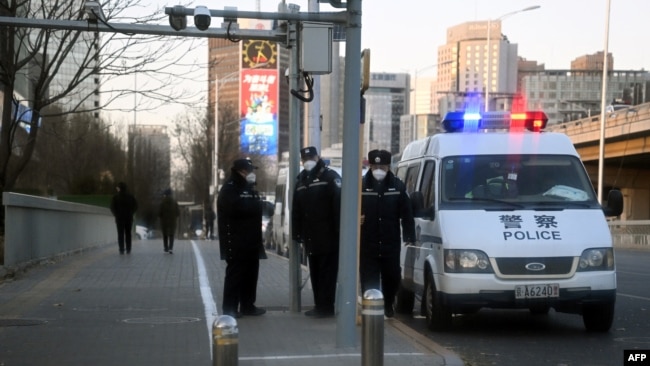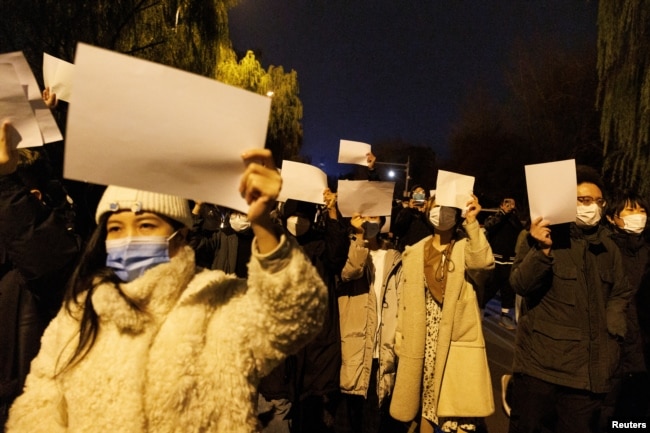No Way Out for China’s Zero-COVID Policy

Major Chinese universities sent students home Tuesday and police guarded major cities to prevent more protests over China’s severe COVID-19 restrictions.
The demonstrations started last Friday, after at least 10 people died in a building fire in the far western city of Urumqi. Reports of the fire led to angry questions online about whether firefighters or victims trying to escape were blocked by anti-virus measures.
Rare protests took place over the weekend in at least eight mainland cities and in Hong Kong. Some protesters could even be heard calling for Chinese President Xi Jinping to step down. The Associated Press reported that police broke up the protests and arrested some people over the weekend.
On Tuesday, officials at Beijing’s Tsinghua University and other schools in the capital announced they were protecting students from COVID-19 by sending them home. The universities said classes and final exams would be held online. Officials at universities in the southern area of Guangdong made similar announcements.
In Shanghai, police stopped people and checked their phones Monday night. A witness told the AP that police were possibly looking for apps banned in China as well as images of protests.
With police out in force, there were no reports of protests Tuesday in Beijing, Shanghai or other mainland cities where crowds gathered days earlier.

Police keep watch on a road by the Liangma River, where recent protests took place for victims of a deadly fire as well as against China's harsh Covid-19 restrictions, in Beijing on November 29, 2022. (Photo by Noel CELIS / AFP)
China’s zero-COVID policy
China established its zero-COVID policy at the beginning of the pandemic. The policy was similar to measures many other countries put in place to try to stop the spread of the virus.
Many countries have since lifted their anti-virus restrictions. But China has continued to enforce its zero-COVID policy. Millions of Chinese have not been permitted to leave their homes for months at a time.
Inside China, individuals need to show their personal “green code” to prove they are free of COVID when entering public places or when using public transportation. If there is an outbreak in an area, local officials may require individuals to be tested regularly to keep their green code. In Beijing, for example, people are required to have a COVID test at least every 48 hours at a government-approved center.
Along with tests and isolation, Chinese officials have locked down parts of cities – or whole cities – to stop the spread of the virus.
A whole building could be locked down if a single person who lives there is found to have COVID. And people living there are not permitted to leave for at least five days. Food and other needed supplies can be ordered for delivery. Currently, the central area of Chongqing is in lockdown. So is part of Guangzhou.
In this photo taken on Sunday, Nov. 27, 2022, a protester reacts as he is arrested by policemen during a protest on a street in Shanghai, China. Authorities eased anti-virus rules in scattered areas but affirmed China's severe "zero- COVID" strategy Monday after crowds demanded President Xi Jinping resign during protests against controls that confine millions of people to their homes. (AP Photo)
‘Cannot lock the country forever’
China’s policy has succeeded in keeping its death count much lower than many Western nations. Chinese officials said the country has only had 5,233 COVID deaths. Most of the deaths were recorded in the early days of the pandemic in 2020.
Julian Tang is a virus expert at Britain’s University of Leicester. He said China’s attempt to stop every single case of COVID is “simply impossible.” He suggested that China should do what most of the rest of the world has done and learn to live with the virus.
“The only thing to do is to accept that there is going to be a certain level of disease,” Tang said.
Ali Mokdad teaches health sciences at the University of Washington in Seattle. He said China’s strict policy saved lives but cannot be continued.
“They cannot lock the country forever,” he said.

People hold white sheets of paper in protest of coronavirus disease (COVID-19) restrictions, after a vigil for the victims of a fire in Urumqi, as outbreaks of the coronavirus disease continue in Beijing, China, November 27, 2022. (REUTERS/Thomas Peter)
Vaccines as the way out
China’s zero-COVID policy means that its population has very little exposure to the virus. China has developed its own vaccines, but they appear to be less effective than the mRNA vaccines widely used in other parts of the world.
Dr. Paul Hunter is a professor of medicine at Britain’s University of East Anglia. He said measures like lockdowns and face coverings were mostly meant to delay as many infections as possible until vaccines were available.
“Unfortunately, the vaccines in China were not very good,” he said.
The health analytics group Airfinity estimated that up to about 2 million people in China could be at risk of death if the country were to lift its “zero-COVID” policy. The estimate is based on China’s low vaccination rates and the lack of natural immunity among its population.
Dr. Bharat Pankhania is an infectious diseases expert at the University of Exeter. Pankhania said Chinese leaders need to find a way out. “The Chinese population is clearly fed up with lockdown after lockdown and the quickest way out is to immunize as fast as possible,” he said.
Pankhania said China should import mRNA vaccines made by Pfizer-BioNTech and Moderna. He said, “The scientific answer is very clear.”
Words in This Story
isolation - n. the state of being separated from others
analytics - n. in-depth study of something
immunity - n. the power to keep yourself from being affected by disease
fed up - adj. very tired or angry about something that has continued for a long time
https://learningenglish.voanews.com/a/no-way-out-for-china-s-zero-covid-policy/6854934.html